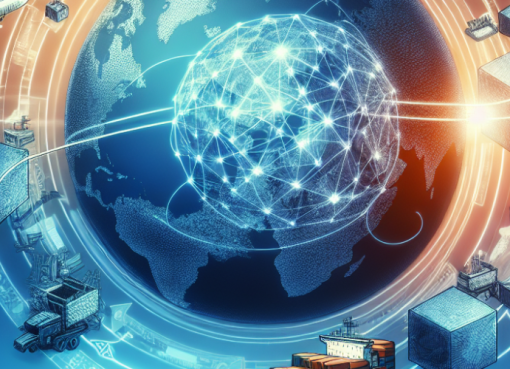In an unprecedented move poised to redefine international trade efficiency, major global logistics companies are increasingly turning to blockchain technology to address the severe disruptions caused by the ongoing global pandemic. This shift not only aims to enhance transparency but also significantly reduce delays and costs associated with shipping and handling across borders.
As industries worldwide continue grappling with supply chain bottlenecks exacerbated by COVID-19, blockchain technology emerges as a beacon of hope. The technology, best known as the backbone of cryptocurrencies like Bitcoin and Ethereum, offers a decentralized ledger system. This system ensures that all transactions or data exchanges within the network are transparent, secure, and immutable.
Several logistics giants, including Maersk and FedEx, have already started implementing blockchain-based platforms. These platforms facilitate real-time tracking of shipments and automate many of the paperwork-heavy processes that are typical in international trade. For example, Maersk’s TradeLens platform, developed in collaboration with IBM, has already processed over half a billion shipment data transactions, underscoring the enormous potential of this technology.
The adoption of blockchain in supply chains could not come at a more critical time. The COVID-19 pandemic has exposed and exacerbated weaknesses in global supply chains, from manufacturing delays due to outbreaks in factory cities to bottlenecks at major ports caused by uneven demand for goods. Blockchain technology promises to mitigate these issues by providing a real-time, unalterable record of where goods are, who has them, and their condition.
Industry experts predict that blockchain could slash the costs and time associated with shipping and logistics. Studies suggest that blockchain could reduce trade documentation and processing costs by up to 20%, a significant figure for an industry valued at several trillion dollars globally. Moreover, the automation of these processes can also help in reducing human errors and increasing the overall efficiency of the shipping lifecycle.
In addition to cost and time efficiency, blockchain also enhances the security and compliance aspects of global trade. The technology’s ability to maintain an immutable and transparent record of all transactions helps prevent fraud and ensures compliance with international trade laws and regulations. This capability is particularly crucial in industries where the provenance and authenticity of products, such as pharmaceuticals and luxury goods, are of paramount importance.
However, despite the clear benefits, the adoption of blockchain in supply chain management is not without challenges. One of the primary obstacles is the technological integration with existing systems. Many companies still rely on legacy technologies, and transitioning to blockchain requires both financial investment and training of personnel. Furthermore, for the full benefits of blockchain to be realized, widespread adoption across the supply chain network is necessary. This requires collaboration and coordination among all stakeholders, including suppliers, customers, logistics providers, and regulators.
To address these challenges, several initiatives and alliances have been formed. The Blockchain in Transport Alliance (BiTA), for instance, counts major logistics companies, technology firms, and transportation providers among its members, working together to forge standards and promote the adoption of blockchain technology across the industry.
As the world continues to navigate the complexities introduced by the pandemic, the role of technology in building resilient supply chains has never been more critical. Blockchain technology, with its promise of transparency, efficiency, and security, stands at the forefront of this transformation. As more companies and industries adopt this technology, the global trade landscape is set to become more robust, agile, and sustainable, benefiting economies and consumers alike.
In conclusion, the integration of blockchain technology into global supply chains is a significant development that could potentially revolutionize the way international trade is conducted. By addressing key issues such as transparency, efficiency, and security, blockchain is not just a tool for improving business operations but also a strategic asset in building a more resilient future post-pandemic. As this technology continues to evolve and more stakeholders come on board, the global supply chain could see unprecedented levels of optimization and innovation.



